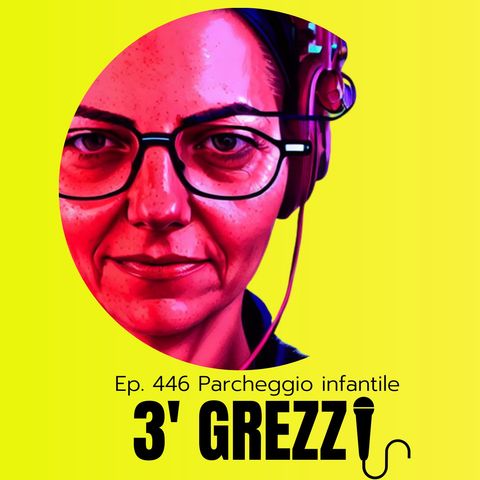3' grezzi Ep. 446 Parcheggio infantile

Download and listen anywhere
Download your favorite episodes and enjoy them, wherever you are! Sign up or log in now to access offline listening.
3' grezzi Ep. 446 Parcheggio infantile
Description
Quando traduco dall'inglese all'italiano a volte mi scontro con neologismi finto-inglesi che rendono tutto più complicato. Avete presente il 'baby parking'? TRASCRIZIONE [ENG translation below] Non mi piace fare la...
show moreTRASCRIZIONE [ENG translation below]
Non mi piace fare la spocchiosa, a meno che non mi si chieda espressamente non correggo mai la pronuncia inglese delle persone. Però è inevitabile che essendo laureata in lingue ed avendo vissuto 23 anni in Australia, e avendo lavorato soprattutto in Australia sempre in professioni che richiedevano l'uso della lingua inglese, non posso fare a meno di notare alcune anomalie che diventano un problema quando devo tradurre qualcosa, soprattutto quando devo tradurre un concetto che in italiano viene descritto usando a sproposito un termine inglese.
Ora non parlo di quei termini che noi ci siamo inventati e che nella lingua inglese non vengono usati, tipo pullover che noi usiamo per dire maglione, ma che in inglese significa tirare su, oppure il modo in cui noi usiamo la parola mister che in inglese significa semplicemente signore che noi invece usiamo come l'allenatore del calcio, o lo smoking, che in inglese significa semplicemente l'atto di fumare.
No, parlo di espressioni che noi abbiamo in qualche modo boh, che ci siamo inventati di sana pianta e che in inglese proprio non vengono usate per niente. Pensate un po' come si usa il body, body in inglese significa corpo, per noi invece è la tutina che si usa per fare attività, attività di ginnastica.
Oppure quando noi ci riferiamo a uno spot, se io dico spot tutti pensano lo spot pubblicitario, in inglese spot vuol dire macchia, o addirittura il water, il gabinetto. Water immagino che sia la parola inglese che significa acqua, che viene pronunciata water, però vabbè, ripeto questi sono casi che sono entrati ormai a far parte della lingua italiana, nel bene e nel male, e la lingua è un essere vivente, quindi si evolve.
No, oggi mi sono confrontata con la traduzione di childcare, un childcare particolare, sono quei posti dove chi va in piscina a fare ginnastica ecc. lascia il bambino, la bambina per il tempo necessario, qualcuno glielo guarda.
Ecco, in italiano questa cosa qua si chiama baby parking, che il parcheggio dei bambini. Io come faccio a tradurre childcare con baby parking? Io non ce la faccio. Io lo so che in Italia si usa, ma è una cosa orribile un parcheggio infantile e i bambini non sono dei pacchi che si parcheggiano, anche perché chi offre questo servizio mette a disposizione personale qualificato. Non va bene, bisogna che ci inventiamo qualcos'altro. Non mi piace il baby parking. Io non lo traduco baby parking, mi rifiuto.
TRANSLATION
I don't like to be snooty, and unless I'm specifically asked, I never correct people's English pronunciation. However, it is inevitable that having a degree in languages and having lived 23 years in Australia, and having worked in Australia always in professions that required the use of the English language, I cannot help but notice some anomalies that become a problem when I have to translate something, especially when I have to translate a concept that in Italian is described using an English term inappropriately.
Now, I'm not talking about those terms that we have made up and that are not used in English, such as pullover that we use to say sweater, but in English means to pull over, or the way in which we use the word mister which in English simply means sir but we instead use is for football coach, or smoking, [tuxedo] which in English simply means the act of smoking.
No, I'm talking about expressions that we somehow have IDK, made up from scratch and that in English are not used at all. Think about how to use body [leotard] in English means body, for us instead it is the onesie that is used to do activities, gymnastic activities. Or when we refer to a spot, if I say spot everyone thinks of the commercial, in English spot means (among other things) stain, or even the toilet bowl, the water, water I guess is the English word that means water, which is pronounced /ˈwoːtə/, but oh well, I repeat these are cases that have now become part of the Italian language, for better or for worse, and the language is a living being, so yes it evolves.
No, today I dealt with the translation of childcare, a particular childcare, those places where people going to the pool to do gymnastics etc. leave the child for the necessary time, and someone is taking care of them. Here, in Italian this thing here is called baby parking, which is a parking lot for children. How do I translate childcare with baby parking? I can't do it. I know that it is used in Italy, but it is a horrible thing to park children, children are not packages to be parked, also because those who offer this service make qualified personnel available. It's not good, we need to come up with something else. I don't like baby parking. I won't use baby parking, I refuse.
Information
| Author | M. Cristina Marras |
| Organization | M. Cristina Marras |
| Website | - |
| Tags |
Copyright 2024 - Spreaker Inc. an iHeartMedia Company

Comments